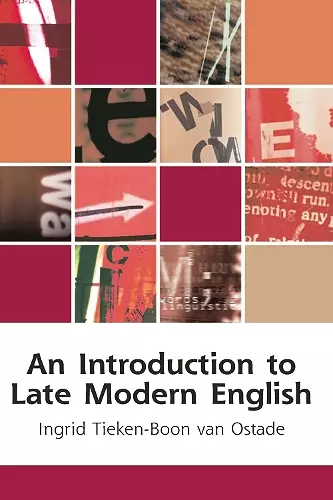An Introduction to Late Modern English
Ingrid Tieken-Boon van Ostade author
Format:Paperback
Publisher:Edinburgh University Press
Published:12th May '09
Should be back in stock very soon

Some twenty years ago it was widely believed that nothing much happened to the English language since the beginning of the eighteenth century. Recent research has shown that this is far from true, and this book offers an introduction to a period that forms the tail end of the standardisation process (codification and prescription), during which important social changes such as the Industrial Revolution are reflected in the language. Late Modern English is currently receiving a lot of scholarly attention, mainly as a result of new developments in sociohistorical linguistics and corpus linguistics. By drawing on such research the present book offers a much fuller account of the language of the period than was previously possible. It is designed for students and beginning scholars interested in Late Modern English.The volume includes:*a basis in recent research by which sociolinguistic models are applied to earlier stages of the language (1700-1900)*a focus on people as speakers (wherever possible) and writers of English*research questions aimed at acquiring skills at working with important electronic research tools such as Eighteenth Century Collections Online (ECCO), the Oxford English Dictionary and the Oxford Dictionary of National Biography*reference to electronically available texts and databases such as Martha Ballard's Diary, the Proceedings of the Old Bailey and Mrs Beeton's Book of Household Management.
Readers are alerted to a wealth of research tools and innovative methods available for the investigation of LModE. Research questions at the end of each chapter encourage readers to make practical use of various electronic resources. The book thus provides an introduction to practical methods of historical linguistics research. While acknowledging the difficulties inherent in interpreting the evidence, this book demonstrates that by combining methods and sources of data, progress can be made towards a comprehensive and reliable account of spoken and written forms of LModE. -- Sharon Marsden, Victoria University of Wellington * Language in Society *
This textbook offers a very useful and stimulating introduction to a long neglected period in the history of the English language. Ingrid Tieken-Boon van Ostade draws on her own extensive research in the field and research in projects supervised by her which have produced fascinating insights. -- Svenja Kranich * LINGUIST list *
There is a need for books like An Introduction to Late Modern English, which can both give teachers more options regarding course literature and link teaching to recent findings in this dynamic area of research. -- Erik Smitterberg, Uppsala University * The Journal of English Language and Linguistics *
Her textbook is therefore a welcome introduction to the language of the Georgian, Regency, and Victorian periods. Each chapter concludes with helpful suggestions for further reading as well as a set of research questions, which will steer students of lModE in the direction of interesting research topics and will guide them through the increasing number of tools and resources for this period of English. -- Marion Elenbaas * Yearbook of English Studies *
Her textbook is therefore a welcome introduction to the language of the Georgian, Regency, and Victorian periods. Each chapter concludes with helpful suggestions for further reading as well as a set of research questions, which will steer students of lModE in the direction of interesting research topics and will guide them through the increasing number of tools and resources for this period of English. -- Marion Elenbaas * Year's Work in English Studies *
ISBN: 9780748625987
Dimensions: unknown
Weight: 222g
176 pages